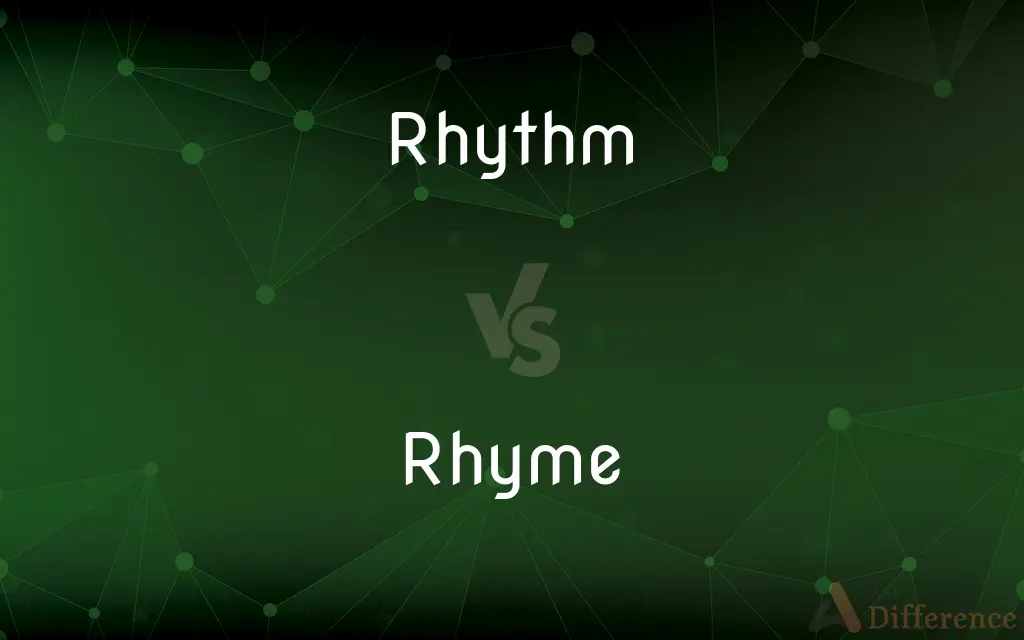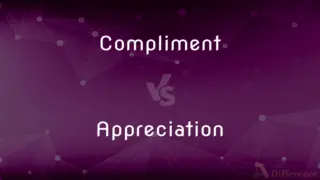Rhythm vs. Rhyme — What's the Difference?
Edited by Tayyaba Rehman — By Fiza Rafique — Updated on November 2, 2023
Rhythm is the pattern of beats in a line of poetry or music, while rhyme is the correspondence of sounds between words, especially at the ends of lines.

Difference Between Rhythm and Rhyme
Table of Contents
ADVERTISEMENT
Key Differences
Rhythm involves the beat and pace, creating movement in poetry and music. Rhyme focuses on matching vowel and consonant sounds, often at line endings, to create harmony.
Rhythm provides structure through stressed and unstressed syllables or beats. Rhyme enhances aesthetics and memory through repetitive sounds, linking words together.
Rhythm can exist without rhyme, giving flow to prose or free verse. Rhyme without rhythm may seem awkward or forced, lacking musicality or natural flow.
In rhythm, timing and cadence are key, regardless of the sounds of words. Rhyme relies on the sound relationship between words, independent of their placement or rhythm.
Rhythm is the heartbeat of a song or poem, while rhyme is often the thread that ties the end of one line to the start of another.
ADVERTISEMENT
Comparison Chart
Definition
The pattern of beats or flow
The matching of sounds between words
Role in Poetry/Music
Provides tempo and structure
Adds to the aesthetics, aids memory
Dependency
Can stand alone without rhyme
Often relies on rhythm for effect
Elements Involved
Timing, cadence, stress
Sound correspondence, word endings
Types
Regular, irregular, free verse, etc.
Perfect, slant, eye, end, internal, etc.
Compare with Definitions
Rhythm
A sequence of beats or stresses in spoken or written language.
The rhythm of her poetry mirrored the waves of the ocean.
Rhyme
The repetition of similar sounding words, especially at the end of lines in poetry or songs.
She penned a rhyme where 'time' met 'sublime'.
Rhythm
The tempo and beat that make music move and flow.
He tapped his foot to the rhythm of the jazz tune.
Rhyme
A rhyme is a repetition of similar sounds (usually, exactly the same sound) in the final stressed syllables and any following syllables of two or more words. Most often, this kind of perfect rhyming is consciously used for artistic effect in the final position of lines within poems or songs.
Rhythm
Rhythm (from Greek ῥυθμός, rhythmos, "any regular recurring motion, symmetry"—Liddell and Scott 1996) generally means a "movement marked by the regulated succession of strong and weak elements, or of opposite or different conditions" (Anon. 1971, 2537).
Rhyme
Correspondence of sound between words or the endings of words, especially when these are used at the ends of lines of poetry
Poetic features such as rhythm, rhyme, and alliteration
Rhythm
Movement or variation characterized by the regular recurrence or alternation of different quantities or conditions
The rhythm of the tides.
Rhyme
(of a word, syllable, or line) have or end with a sound that corresponds to another
Balloon rhymes with moon
Rhythm
The patterned, recurring alternations of contrasting elements of sound or speech.
Rhyme
Correspondence of sounds at the ends of words or phrases, especially when involving the last stressed vowel and all succeeding sounds in each of two or more such words or phrases.
Rhythm
The patterning of musical sound, as by differences in the timing, duration, or stress of consecutive notes.
Rhyme
A word that exhibits such correspondence with another, as behold and cold.
Rhythm
A specific kind of such patterning
A waltz rhythm.
Rhyme
A poem or verse employing such correspondence as a formal feature, especially at the ends of lines.
Rhythm
A group of instruments supplying the rhythm in a band.
Rhyme
Poetry or verse of this kind.
Rhythm
The pattern or flow of sound created by the arrangement of stressed and unstressed syllables in accentual verse or of long and short syllables in quantitative verse.
Rhyme
To form a rhyme.
Rhythm
The similar but less formal sequence of sounds in prose.
Rhyme
To compose rhymes or verse.
Rhythm
A specific kind of metrical pattern or flow
Iambic rhythm.
Rhyme
To make use of rhymes in composing verse.
Rhythm
The sense of temporal development created in a work of literature or a film by the arrangement of formal elements such as the length of scenes, the nature and amount of dialogue, or the repetition of motifs.
Rhyme
To put into rhyme or compose with rhymes.
Rhythm
A regular or harmonious pattern created by lines, forms, and colors in painting, sculpture, and other visual arts.
Rhyme
To use (a word or words) as a rhyme.
Rhythm
The pattern of development produced in a literary or dramatic work by repetition of elements such as words, phrases, incidents, themes, images, and symbols.
Rhyme
Rhyming verse (poetic form)
Rhythm
Procedure or routine characterized by regularly recurring elements, activities, or factors
The rhythm of civilization.
The rhythm of the lengthy negotiations.
Rhyme
A thought expressed in verse; a verse; a poem; a tale told in verse.
Rhythm
The variation of strong and weak elements (such as duration, accent) of sounds, notably in speech or music, over time; a beat or meter.
Dance to the rhythm of the music.
Rhyme
(countable) A word that rhymes with another.
Rhythm
A specifically defined pattern of such variation.
Most dances have a rhythm as distinctive as the Iambic verse in poetry
Rhyme
A word that rhymes with another, in that it is pronounced identically with the other word from the vowel in its stressed syllable to the end.
Rhythm
A flow, repetition or regularity.
Once you get the rhythm of it, the job will become easy.
Rhyme
(uncountable) Rhyming: sameness of sound of part of some words.
Rhythm
The tempo or speed of a beat, song or repetitive event.
We walked with a quick, even rhythm.
Rhyme
(linguistics) rime
Rhythm
The musical instruments which provide rhythm (mainly; not or less melody) in a musical ensemble.
The Baroque term basso continuo is virtually equivalent to rhythm
Rhyme
(obsolete) Number.
Rhythm
A regular quantitative change in a variable (notably natural) process.
The rhythm of the seasons dominates agriculture as well as wildlife
Rhyme
(ambitransitive) To compose or treat in verse; versify.
Rhythm
Controlled repetition of a phrase, incident or other element as a stylistic figure in literature and other narrative arts; the effect it creates.
The running gag is a popular rhythm in motion pictures and theater comedy
Rhyme
Of a word, to be pronounced identically with another from the vowel in its stressed syllable to the end.
Rhythm
A person's natural feeling for rhythm.
That girl's got rhythm, watch her dance!
Rhyme
(reciprocal) Of two or more words, to be pronounced identically from the vowel in the stressed syllable of each to the end of each.
Rhythm
In the widest sense, a dividing into short portions by a regular succession of motions, impulses, sounds, accents, etc., producing an agreeable effect, as in music poetry, the dance, or the like.
Rhyme
To somewhat resemble or correspond with.
Rhythm
Movement in musical time, with periodical recurrence of accent; the measured beat or pulse which marks the character and expression of the music; symmetry of movement and accent.
Rhyme
To number; count; reckon.
Rhythm
A division of lines into short portions by a regular succession of arses and theses, or percussions and remissions of voice on words or syllables.
Rhyme
An expression of thought in numbers, measure, or verse; a composition in verse; a rhymed tale; poetry; harmony of language.
A ryme I learned long ago.
He knewHimself to sing, and build the lofty rime.
Rhythm
The harmonious flow of vocal sounds.
Rhyme
Correspondence of sound in the terminating words or syllables of two or more verses, one succeeding another immediately or at no great distance. The words or syllables so used must not begin with the same consonant, or if one begins with a vowel the other must begin with a consonant. The vowel sounds and accents must be the same, as also the sounds of the final consonants if there be any.
For rhyme with reason may dispense,And sound has right to govern sense.
Rhythm
The basic rhythmic unit in a piece of music;
The piece has a fast rhythm
The conductor set the beat
Rhyme
Verses, usually two, having this correspondence with each other; a couplet; a poem containing rhymes.
Rhythm
Recurring at regular intervals
Rhyme
A word answering in sound to another word.
Rhythm
An interval during which a recurring sequence of events occurs;
The neverending cycle of the seasons
Rhyme
To make rhymes, or verses.
There marched the bard and blockhead, side by side,Who rhymed for hire, and patronized for pride.
Rhythm
The arrangement of spoken words alternating stressed and unstressed elements;
The rhythm of Frost's poetry
Rhyme
To accord in rhyme or sound.
And, if they rhymed and rattled, all was well.
Rhythm
Natural family planning in which ovulation is assumed to occur 14 days before the onset of a period (the fertile period would be assumed to extend from day 10 through day 18 of her cycle)
Rhyme
To put into rhyme.
Rhythm
The patterned recurrence of elements in motion.
Dancers moved to the complex rhythm of the music.
Rhyme
To influence by rhyme.
Hearken to a verser, who may chanceRhyme thee to good.
Rhythm
The systematic arrangement of musical sounds, principally according to duration and periodic stress.
The drummer's rhythm set the pace for the band.
Rhyme
Correspondence in the sounds of two or more lines (especially final sounds)
Rhythm
A regular pattern of change or movement.
The seasons follow the earth's natural rhythm.
Rhyme
A piece of poetry
Rhyme
Compose rhymes
Rhyme
Be similar in sound, especially with respect to the last syllable;
Hat and cat rhyme
Rhyme
A word agreeing with another in terminal sound.
Love is often in rhyme with above in poems.
Rhyme
A verse or piece of poetry having corresponding sounds.
The child enjoyed the simple rhyme of moon with June.
Rhyme
To make or form a rhyme.
The poet strives to rhyme 'orange' with 'door hinge'.
Rhyme
The use of rhyming to create rhythm and music in verse.
The rhyme scheme ABAB added melody to her sonnet.
Common Curiosities
Can a poem have rhythm without rhyme?
Yes, poems can have rhythm without rhyme, as seen in free verse poetry.
How does rhythm affect a poem?
Rhythm affects a poem's flow, pace, and emotional impact.
What are examples of rhyme?
Examples include perfect rhyme, slant rhyme, internal rhyme, and end rhyme.
Are rhythm and rhyme the same in all languages?
No, rhythm and rhyme vary across languages due to differences in phonetics and structure.
What is rhythm in literature?
Rhythm is the pattern of stressed and unstressed syllables in a line of writing.
Is rhyme necessary in music?
Rhyme is not necessary, but it can add to a song's catchiness and memorability.
What are the types of rhythm?
Types of rhythm include regular, irregular, dactylic, anapestic, and more.
What's the difference between meter and rhythm?
Meter is a regular pattern of rhythm, while rhythm is a broader term that can be regular or irregular.
What's an example of internal rhyme?
Internal rhyme occurs within lines, such as "The heat of the beat."
Do all songs have a distinct rhythm?
Yes, all songs have a rhythm, which is the beat or tempo that listeners can feel and move to.
What is a rhyme scheme?
A rhyme scheme is the pattern of end rhymes in a poem, often marked by letters.
Does rhyme contribute to meaning in poetry?
Rhyme can reinforce meaning through emphasis and pattern but does not create meaning itself.
How does rhythm enhance music?
Rhythm gives music a tempo, helps to create patterns, and can make music danceable.
Can rhythm be found in prose?
Yes, prose often has its own rhythm, though less structured than in poetry.
What is the function of rhyme in children's poetry?
Rhyme makes children's poetry more engaging, easier to remember, and helps with language learning.
Share Your Discovery

Previous Comparison
Compliment vs. Appreciation
Next Comparison
Dermatologist vs. CosmetologistAuthor Spotlight
Written by
Fiza RafiqueFiza Rafique is a skilled content writer at AskDifference.com, where she meticulously refines and enhances written pieces. Drawing from her vast editorial expertise, Fiza ensures clarity, accuracy, and precision in every article. Passionate about language, she continually seeks to elevate the quality of content for readers worldwide.
Edited by
Tayyaba RehmanTayyaba Rehman is a distinguished writer, currently serving as a primary contributor to askdifference.com. As a researcher in semantics and etymology, Tayyaba's passion for the complexity of languages and their distinctions has found a perfect home on the platform. Tayyaba delves into the intricacies of language, distinguishing between commonly confused words and phrases, thereby providing clarity for readers worldwide.
















































